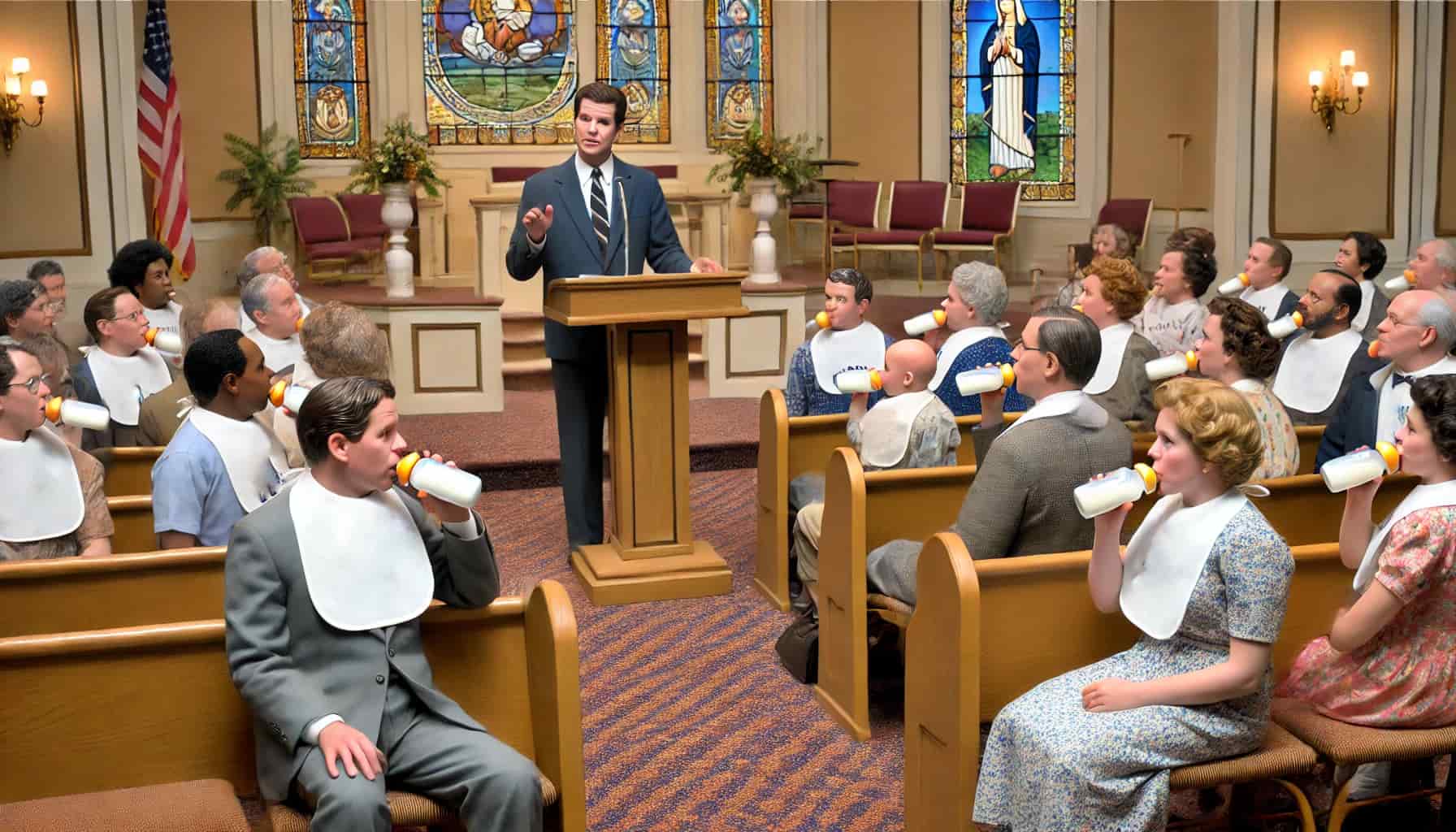
When I was training for the ministry, one of the things I remember my professors saying was, "Put the cookie on the bottom shelf." What they meant by that was that we need to guard against teaching over people's heads. We need to make our teaching accessible to all.
I'm all for putting the cookie on the bottom shelf. But I think in some Christian circles, we may have taken it too far. Many, in an attempt to be accessible, have put the cookie on the floor to be trampled on. Many more, in an attempt to make the cookie more digestible, have changed the recipe, turning it into a baby biscuit.
I've experienced the error of know-it-all-ism. I've been around men whose teaching is so high and littered with jargon that only the giraffes in the congregation can get fed (and they have to work at it). That kind of thing may appeal to some proud people, but it should have no quarter in the church of God.
But, in my experience, what's far more common is ignorance. In many cases, this ignorance is glorified, spiritualized, and becomes food for the pride of a different kind of man. For every time I've been "doctored" by the high-minded, I've heard a dozen quips like:
- "I'm just an unschooled country preacher." (Spoken with pride.)
- "I didn't go to no cemetery." (Meaning seminary)
- "I don't want no teacher, I want a preacher!"
- "I know a little Greek; he runs a restaurant downtown."
- Etc.
In this mindset, to be well-spoken and knowledgeable is to be suspect. "Smart" is an insult. It is this attitude I want to address in this post.
Neither God nor His Word is Anti-Intellect
Christians believe that everything in our creation is the product of an all-knowing God. God knows everything, and out of His eternal and infinite knowledge, He created.
Human beings were created with brains and commanded to use them. Adam's first job in the garden (naming the animals) was an intellectual job. We were told in the Garden to subdue the earth, a job that would require every ounce of our God-given and God-derived intellect.
When God chose to reveal Himself to mankind, His chosen medium was a book. A book with words and ideas, sentences and paragraphs. A book full of teachings and logical arguments that have stretched the brains of some of the world's most brilliant men for thousands of years.
Time and again in that book (the Bible), God indicates that people need His wisdom, instruction, and knowledge. He tells us that the Bible makes wise the simple and enlightens the eyes (Psalm 19:7-8).
Wherever our modern strains of anti-intellectualism come from, they do not come from God and they do not come from the Bible.
The Apostles May Have Started as Unlearned and Ignorant Men, but They Didn't Stay There
In Acts 4:13, it says that the people perceived that John and Peter were "unlearned and ignorant men." This, of course, refers to the fact that they were fishermen and not scholars - but it isn't true. Peter and John had spent three years in full-time study with the greatest Teacher who ever lived, and it is abundantly obvious if you read their preaching and writing that they were deep, articulate, and well-reasoned.
Peter may have been an unlearned fisherman, but he never once gloried in his ignorance. By the time Peter sat to write the books with his name, he had developed into a logical writer with a deep knowledge of the Old Testament and theology.
When we read Paul, we see a man who was educated, knew culture, was well-read in both the religious writings of the Jews and the writings of the secular world, and who was extremely well-reasoned. Luke opened the book of Luke with a formal introduction written in classical Greek.
There is a Danger in Over-Simplifying
The Bible contains simple concepts that even a child can understand, but it is not simple. It contains 66 books written over thousands of years by dozens of men in at least three languages. None of those books are childish.
Take Romans as an example. Romans is considered by many to be the essential book explaining our salvation by grace through faith. We've adopted Romans into the "Romans Road" and use it to teach people about the free gift of salvation. But Romans is far from simple and simplistic - it makes a tight and cogent argument for why we need salvation that draws from nature and a deep understanding of the Old Testament.
Every Bible preacher who has ever lived tries to make the scriptures simple. There is nothing wrong with that. Line upon line, here a little, there a little. However, it becomes a problem when we oversimplify the teaching of scripture: you can reduce something so much that it changes to something else.
You could argue, for example, that the Pharisees had so oversimplified the Old Testament that they turned it into a simple list of rules. They missed the meaning and weightier matters. We can be guilty of doing the same.
Rather than bringing people up to the level of the Bible, we bring the Bible down to the level of the people, and thus rob people of much of what the Bible actually teaches.
Some of this is necessary: babies, after all, need milk, not steak - but those babies don't need to stay babies. They should grow to eventually eat steak, not be on a diet of baby food for seventy years.
Imagine going to a friend's house and sitting around their table for a meal, and the mom serves everyone a can of Gerber with a side of baby rice cereal. When you ask about this, they point to the lone infant in the room and say, "We don't want to serve anything she can't digest." This would result in an anemic family and stunted growth.

Something akin to this bizarre scenario happens in churches every week where the teaching is dumbed-down for the baby Christians, leaving the mature majority in a state of spiritual starvation. How much better is it to feed the babies on the side and give the adults a real meal?
God Wants Pastors Who are Teachers
Far too many times, I've heard "teacher" used as a pejorative against faithful pastors. (I.e., "He's a good teacher but he ain't no preacher.") I've heard sermons on 2 Timothy 4:3 (men will no longer endure sound doctrine, but will heap to themselves teachers having itching ears) where the emphasis is on how bad it is to be a teacher. There is a mindset that seems to think that being a good preacher and being a good teacher are two separate things in opposition to each other.
This mindset cannot survive an honest reading of the New Testament:
- "Teaching them to observe all things" is as much a part of the Great Commission as "preach the gospel" (Matthew 28:19-20).
- God's gift to the church includes the gift of pastors/teachers (together in the Greek in Ephesians 4:11).
- The only skill requirement for bishops is that they be "apt to teach" (1 Timothy 3:2, 2 Timothy 2:24).
Matthew 7:29 and Mark 1:22 both tell us that Jesus taught them as one having authority, and not as the scribes. It's true that the scribes of Jesus' day were too intellectual, but it's also true that Jesus still taught them.
The best definition of preaching I've heard is "teaching with authority." Authority in preaching is important, but without teaching, it is just an angry fool yelling at people. The authority of our preaching doesn't come from our raised voice, accent, or gesticulations - it is derived from the correct understanding of the word of God.
Spurgeon famously said the five ingredients of a great sermon are "light, fire, faith, life, and love." There was a reason he listed "light" first. In another place, he said, "The best way of keeping people's attention is telling them something worth listening to."
The gospel is itself an offense and foolishness to the wise of this world - we do not need to make it more offensive by patronizing people and dumbing it down. God knew what He was doing when He gave us His word; we do not need to try to improve on it to make it simpler for the masses.
The results of dumming it down
In Hosea 4:6 the prophet says my people are destroyed for lack of knowledge. When Proverbs 29:18 says "where there is no vision, the people perish" - it's not talking about your next "vision night" for your church, but people perishing because they cannot see the word of God clearly. (As is evidenced by the second couplet of that verse but he that keepeth the law, happy is he.)
A deep knowledge of the word of God isn't some optional bourgeois accessory to the the Christian faith, it is an absolutely vital part of our sanctification. (2 Timothy 3:16,17, 2 Corinthians 4:6)
Our people need more than three points and a poem, a motivational speech, a short list of dos and don'ts, and an occasional watered-down gospel message. They need the strong meat of the word of God.
Maybe one reason why our churches are dysfunctional is because we have been feeding people a steady diet of baby food and cotton candy. Maybe they are fleeing to the "cooler" churches because they really aren't being fed, and at least they can get a newer variety of baby food there.
A challenge
I'm not telling you to try to be smarter. (How foolish would that be.) I'm imploring you to stick to the Bible. Don't water it down to make it more palatable to the masses - bring the masses up to the scripture.
If the men in your church can understand the difference between a nickel and dime offense, or tell you all about the pros and cons of their favorite basketball team, they can be brought to know and understand the scripture without dumbing it down.
I think your people are probably smarter than you give them credit for, after all, they are made in the image of God. Stop patronizing them. Stop watering it down. Teach and preach the word.